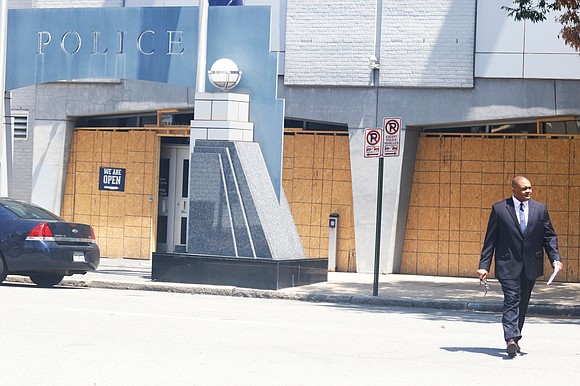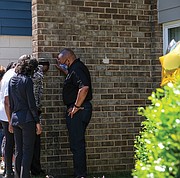Jury still out
After a year on the job, Richmond Police Chief Gerald Smith has not won over many officers or residents either through style or substance
Jeremy M. Lazarus | 8/12/2021, 6 p.m.

A year ago, Gerald M. Smith was introduced to the city as an “innovator” and a “reform-minded change agent” as Mayor Levar M. Stoney introduced him as Richmond’s new police chief.
“Gerald Smith is who Richmond needs right now — a reform-minded leader with deep experience in community policing and de-escalation,” said Mayor Stoney, who tapped him on the recommendation of Rodney Monroe, a former police chief in Richmond and Charlotte, N.C.
A year later, there are few signs of reform being accomplished in the department or in its relationship with the community.
Just before he started on July 1, 2020, Chief Smith said, “We’re looking for this community to be deeply involved in the police department, and we’re looking to be deeply involved in the community.”
As best as can be determined, that hasn’t happened either.
Currently, his biggest challenge is fielding enough officers as violence spikes. Homicides and other shooting crimes are happening almost nightly, and robberies and assaults also are on the rise.
It’s a far different scene from when Chief Smith arrived. At the time, the big focus for police was on racial justice protests and preventing further violence He came just as Richmond began taking down its Confederate statues and demonstrators were nightly clashing with officers.
Chief Smith, 52, brought plenty of experience. Before assuming command of the largest department in Richmond’s government and becoming one of the city’s highest paid officials at a salary of $185,000 a year, he had spent 30 years on the Charlotte police force where he had risen through the ranks from patrol officer to deputy chief commanding investigations.
A big man with a bald head and a football player’s brawny physique, the city’s 20th police chief almost appears to have come out of central casting. But a year later, he remains little known. Unlike previous chiefs Rodney Monroe and Alfred Durham, he does not mingle easily with the public or with those he commands.
Most who have met him consider him personable and easy to talk with. When a reporter at a public event asked him a question about stolen guns, he delivered a two-minute monologue about the department’s efforts to encourage the public to lock up weapons.
His schedule is tightly controlled. He told one reporter who had been seeking an interview for six weeks that “I have been willing, but my staff had other ideas.”
He also is known to bristle at criticism. Insiders said he went to one precinct roll call, left abruptly when the officers began questioning him and has never attended another.
Mayor Stoney, though, remains bullish on the chief.
“Chief Smith is leading the Richmond Police Department in the right direction,” Mayor Stoney stated in an email to the Free Press. “Under his leadership, the department has emerged from an unprecedented year more engaged and accountable, with a renewed focus on community partnerships geared toward prevention and intervention.
“Chief’s Smith’s job going forward,” the mayor added, “is to continue to build” relationships within the community and involve the public in assisting with public safety. That’s “the key to a safer city, and I know it’s a goal to which he is fully committed. Public safety is not one person’s job, but a shared responsibility between our residents and the officers sworn to protect them,” the mayor stated.
Even so, as violence spiked, the mayor had no problem not providing funding for 39 vacant officer positions, ensuring they couldn’t be filled. Chief Smith acknowledges the department is struggling to recruit new officers and currently has at least 75 total vacancies in the sworn force.
He has a total of 675 sworn officers, including 19 recruits who will graduate in September, according to the department. With other officers out on family leave, performing National Guard service, dealing with health issues or awaiting results of disciplinary action, only about 630 officers are available, forcing Chief Smith to use mandatory overtime to ensure there are a few officers available per shift in each precinct.
Some blame the decline on the city’s salary scale, which now provides officers with less pay than Henrico and Chesterfield counties. City Council has authorized a study to determine what pay increases might be needed in the next budget amid worries about a potential $12 million cost to upgrade both police and firefighter pay.
Still, the rise in shootings, robberies and assaults also is arousing concern. Department figures show that 87 homicides have occurred since the chief arrived. Since the beginning of the 2021-22 fiscal year on July 1, there have been 12 killings.
Chief Smith’s ability to motivate his force and deal with the situation is complicated by his management style. Inside the department, he is generally getting a thumbs down. Based on Free Press interviews, the chief is viewed as distant and, as one person put it, “not a good fit.”
He has been dinged for passing by officers and not speaking and in general has made little effort to meet officers in the lower ranks.
Evidence of his stand offish approach to his officers was visible at the National Night Out kickoff event on Aug. 3. He spoke with the mayor and members of the media, but it was noticeable that he kept his distance from lower-ranking police officers.
He has stamped his mark on the command staff. In a bid to show he was serious about reform, he set up an Office of Professional Accountability and brought back a former department lawyer, Victoria Pearson, to lead it.
Officers tell the Free Press, he has proven indecisive on discipline, leaving investigative reports from internal affairs stacked on his desk and not acted on for weeks and even months, in a few cases without a decision.
Since he arrived, though, Richmond has not experienced any highly publicized police shootings or other incidents.
Seven months in, he swept from the command staff three respected officers with more than 90 years combined experience with the force, including an officer who had served as interim chief before his appointment.
It took nearly six months for Chief Smith to fill one of the vacant slots in the command staff. In doing so, Chief Smith did not promote from within but went 3,000 miles away to select a veteran captain from the Seattle police force, John F. Hayes Jr., to become deputy chief of patrol.
Strikingly, the chief did not publicly announce the hire or send out an internal tweet or email to notify his officers, the Free Press was told.
Outside assessments of Chief Smith’s job performance have proved harder to come by. Representatives of a police watchdog group, the Richmond Transparency and Accountability Project, did not respond to a request for comment.
Nor did eight members of City Council. The only person to respond to a request for comment, 8th District Councilwoman Reva M. Trammell, chair of council’s Public Safety Committee, did so only after a reporter caught up to her at a public event.
She provided a tepid endorsement.
“I think he’s doing a good job,” Ms. Trammell said, adding that “he lacks the resources. He has 100 vacancies. He doesn’t have the manpower.”
For now, Chief Smith is here to stay. This summer, he scotched rumors that he had applied for the vacant chief’s position in Durham, N.C.
And for now, his focus is on the current challenges — gun violence, calls for service and training needs. Even if unseen, he noted in a published statement, “we are taking active steps to mitigate these issues.”






